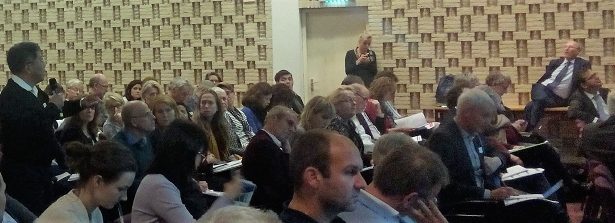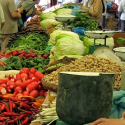Report “The Future for Food Systems”

The aim of the workshop “The Future for Food Systems” was to support systematic food systems research as an analytical and policy device. The seminar was organized by Wageningen University & Research and IFPRI together with FOODSECURE & SUSFANS. Participants were about 100 researchers and experts from private sector, government and civil society organizations.
Some workshop highlights are mentioned below. Please download the full report (PDF) for a more extensive description of the debate and for links to further information.
Workshop Outcomes
One of the main outcomes of the workshop was that food system research can function as an idea generator for interventions. Food systems research is important to understand and inform policy and individual choices on the complex systems that influence our food choices and co-determine our health.
A second conclusion was that interventions must be developed on a local scale together with local stakeholders, including consumers and traders in the (in)formal sector.
“Decisions made in the food systems are important for public health and the environment”, said Agriculture for Nutrition & Health (A4NH) director John McDermott. At global level the current food systems do not deliver enough on health: still more than 800 million people suffer from chronic hunger, 2 billion people face undernutrition, and as many as 2 to 2.5 billion people are overweight or obese. Moreover, food systems are at the heart of many environmental problems and need to contribute to solutions for sustainable resource use.
Director of WUR Social Science group Van der Vorst: “The key knowledge challenge is to bring together the different perspectives on and assess the trade-offs between sustainable consumption and healthy nutrition, robust supply chains and climate-smart production systems.”
Henk Westhoek of PBL Netherlands Environmental Assessment Agency gave a definition of a food system: “A food system considers all the elements (environment, people, inputs, processes, infrastructures, institutions) and activities that relate to primary producing, processing, distributing, preparing and consuming food, and the socio-economic and environmental outcomes of these activities.” A food system is much more complicated than a food chain, he explained. It’s more like a “food web” in which farmers, traders, food companies, retailers, and consumers continuously influence each other’s activities.
“Food systems represent a welcome widening of perspective from production-based approaches”, said Martin van Ittersum (WUR) with wide agreement among the audience. However, there was a lot of discussion about the perceived drivers that influence the outcomes of food systems. Those present agreed that – amongst others – cultural habits are an important driver. Also, the question how to scale up a successful pilot was discussed, as one of the pillars of food systems research.
Background
The workshop was organized within the framework of the Wageningen University & Research (WUR) strategic research program (KB22) on Global Food & Nutrition Security (GF&NS) and marks the start of the Wageningen-led flagship program “Food Systems for Healthier Diets” that will form part of the CGIAR research program Agriculture for Nutrition & Health (A4NH) in 2017-2022. The workshop was co-organized with the EU-funded research projects FOODSECURE and SUSFANS, which explore the future of global and European food and nutrition security, balanced diets and the sustainability of food systems.
Please follow this link for further information and access to the full report.






